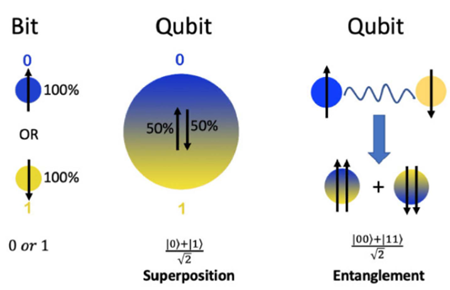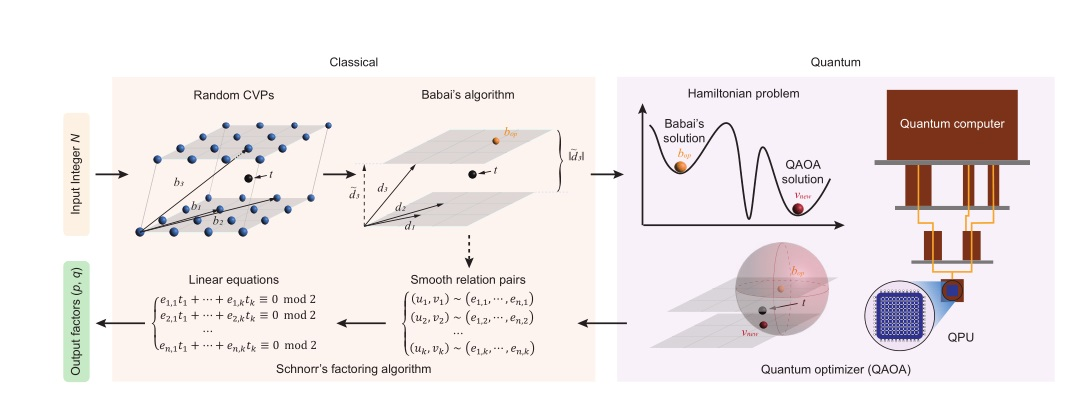1. Introduction: When Future Tech Meets Digital Finance
Cryptocurrencies have really shaken up the financial scene by letting people make secure, decentralized transactions and offering a game-changing way to handle and move assets around. But a lot of this encryption security relies on encryption algorithms that keep blockchain networks safe. Take Bitcoin, for example. It uses cryptographic methods like SHA-256 and ECDSA to secure transactions and make sure only the right people can access their wallets.
Now, here comes quantum computing, a groundbreaking tech that could mess with the basics of modern cryptography. Quantum computers, which work on the principles of quantum mechanics, promise to outdo regular computers in certain tasks, like breaking encryption. This leads to an important question: Can quantum computers crack Bitcoin?
In this article, we’ll look at the potential dangers that quantum computing poses to Bitcoin, other cryptocurrencies, and the whole financial system. We'll also talk about how the crypto world might get ready for a quantum future and what steps traders can take to protect their digital assets.
2. What Is Quantum Computing and Why Is It So Powerful?
Quantum computing is totally different from regular computing. In classical systems, info is processed as binary data (0s and 1s). But quantum computers use qubits, which can be in multiple states at once. This cool feature of qubits comes from two key quantum ideas: superposition and entanglement.
-
Superposition: A qubit can represent both 0 and 1 at the same time, which lets quantum computers handle way more data than classical computers.
-
Entanglement: When qubits get entangled, the state of one can instantly influence another, no matter how far apart they are. This helps quantum computing applications do complex calculations more efficiently.
For instance, while a classical computer would try to crack an encryption key by going through each possible combo one by one, a quantum computer could check all possible combinations at once. This means quantum computers can break encryption way faster than traditional ones.
Key Applications of Quantum Computing:
Quantum computing has the power to change how we do complex calculations, but it also poses a threat to traditional cryptography techniques, like those used in Bitcoin.
3. How Cryptocurrencies Are Threatened by Quantum Computing
Bitcoin and a bunch of other cryptocurrencies depend a lot on public-key cryptography to secure transactions. They use ECDSA (Elliptic Curve Digital Signature Algorithm) to create public and private keys, and SHA-256 in Bitcoin’s proof-of-work system to validate blocks on the blockchain. While these Bitcoin encryption algorithms are safe in today’s computing world, they could be vulnerable to quantum attacks.
One of the biggest threats here is Shor’s Algorithm. This algorithm lets quantum computers factor large numbers really quickly, which can break RSA and ECC (Elliptic Curve Cryptography) systems that secure many digital currencies.
Here’s why quantum computing is a big deal for cryptocurrencies like Bitcoin:
-
Private Key Exposure: Bitcoin uses public-key cryptography, which means everyone can see the public key. If quantum computers get smart enough, they could figure out the private key from the public one, letting hackers access and steal money from Bitcoin wallets.
-
Transaction Forging: Quantum computers could create fake signatures, which means attackers could mess with transaction records on the blockchain and make unauthorised transactions.
As quantum computing improves, the chance of hidden Bitcoin assets being exposed and stolen gets higher. Attackers could go after public keys and crack private keys that we thought were safe.
Cryptographic Algorithms in Bitcoin and Vulnerabilities to Quantum Computing:
Real-World Quantum Vulnerability Example:
4. Real-World Simulations: Quantum Threats Are No Longer Sci-Fi
The worries about quantum computing aren’t just ideas. Many companies and research labs are doing real quantum experiments to see what quantum attacks could mean for encryption. For example, Google’s 2019 “quantum supremacy” test showed that a quantum computer could solve certain problems way faster than the strongest classic supercomputers. While that specific task wasn’t about encryption, it proved that quantum computers can tackle tough calculations that regular computers struggle with.
Simulated Quantum Computing Attack on RSA and ECDSA:
Quantum attack case study shows that we might only have a few years before quantum computers can break common encryption methods, including those that protect digital currencies.
5. Impact on Multi-Asset Markets: CFD, Forex, and Crypto in a Quantum Era
The effects of quantum computing go beyond just cryptocurrencies; they could shake up regular financial markets too. CFDs (Contracts for Difference) and forex markets, which often deal with digital assets like Bitcoin, are also at risk from quantum attacks. If quantum computers can break crypto encryption, they could also target other assets that rely on similar security, causing major disruptions.
Potential Market Risks:
6. Current Solutions and Future Outlook: Post-Quantum Cryptography
To fight the quantum threat, post-quantum cryptography (PQC) is in the works. PQC algorithms are made to stand up to quantum computer attacks. The U.S. National Institute of Standards and Technology (NIST) is working to find and standardize post-quantum encryption algorithms that can replace older encryption methods like RSA and ECDSA.
PQC Solutions Comparison:
7. Industry Response: How Governments, Tech Giants, and Platforms Are Defending
Governments and big tech companies are already gearing up for the quantum shift. The U.S. National Quantum Initiative (NQI) is speeding up research into quantum tech, and companies like IBM, Microsoft, and Deloitte are creating quantum-safe solutions. Blockchain platforms are also exploring post-quantum cryptography to get ready for the future, focusing on quantum defense strategy to protect digital assets.
Industry Actions Against Quantum Threats:
8. Conclusion: Start Preparing for the Post-Quantum Era
The quantum threat isn’t just a theory anymore. As quantum computing tech moves forward, the digital finance world needs to take action now to keep cryptocurrencies secure. Embracing post-quantum cryptography, using quantum-safe wallets, and keeping up with the latest in quantum tech will be crucial for navigating the post-quantum era.
The crypto industry has to get ready to defend its digital assets from the upcoming quantum threats. By preparing now, we can make sure cryptocurrencies keep thriving in a world powered by quantum technology. Securing crypto asset security is a top priority as we move forward into the digital finance future.
Call to Action
Keep up with the times at BTCdana.com – your go-to place for safe crypto trading. Get ready for the future of digital money with super secure solutions. Join us today and keep your assets safe from new risks!































